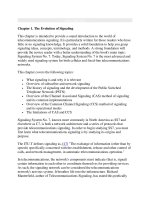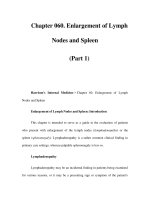EUROPEAN BROAD CASTING LAW AND POLICY Part 1 ppsx
Bạn đang xem bản rút gọn của tài liệu. Xem và tải ngay bản đầy đủ của tài liệu tại đây (240.42 KB, 38 trang )
This page intentionally left blank
EUROPEAN BROADCASTING
LAW AND POLICY
European broadcasting policy has attracted attention from many disci-
plines because it has dual nature: cultural and commercial. This book offers
adetailed treatment of European broadcasting law, set against an overview
of policy in this area. In this respect the authors identify tensions within
the EU polity as regards the appropriate level, purpose and mechanism
of broadcast regulation. Key influences are problems of competence, the
impact of changing technology and the consequences of increasing com-
mercialisation. Furthermore, the focus of the analysis is on the practical
implications of the legal framework on viewers, and the authors distin-
guish both between citizen and consumer and between the passive and
active viewer. The underlying question is the extent to which those most
in need of protection by regulation, given the purpose of broadcasting, are
adequately protected.
jackie harrison is Professor of Public Communication at the Uni-
versity ofSheffield. Her three principal research interests are the study of
news; European communication, information and audio-visual policy and
regulation; and public service broadcasting and communication. She is an
established author, and has undertaken many funded research projects for
the television industry.
lorna woods is Professor in Law at the University of Essex. She is known
for her work in the fields of EC law and, particularly, media regulation and
freedom of expression. She is co-author of a best-selling textbook in the
field of EU law and has written a monograph on the free movement of
goods and services.
EUROPEAN BROADCASTING
LAW AND POLICY
JACKIE HARRISON AND LORNA WOODS
CAMBRIDGE UNIVERSITY PRESS
Cambridge, New York, Melbourne, Madrid, Cape Town, Singapore, São Paulo
Cambridge University Press
The Edinburgh Building, Cambridge CB2 8RU, UK
First published in print format
ISBN-13 978-0-521-84897-8
ISBN-13 978-0-521-61330-9
ISBN-13 978-0-511-36623-9
© Jackie Harrison and Lorna Woods 2007
2007
Information on this title: www.cambridge.org/9780521848978
This publication is in copyright. Subject to statutory exception and to the provision of
relevant collective licensing agreements, no reproduction of any part may take place
without the written
p
ermission of Cambrid
g
e University Press.
ISBN-10 0-511-36623-X
ISBN-10 0-521-84897-0
ISBN-10 0-521-61330-2
Cambridge University Press has no responsibility for the persistence or accuracy of urls
for external or third-party internet websites referred to in this publication, and does not
g
uarantee that any content on such websites is, or will remain, accurate or a
pp
ro
p
riate.
Published in the United States of America by Cambridge University Press, New York
www.cambridge.org
hardback
paperback
paperback
eBook (EBL)
eBook (EBL)
hardback
CONTENTS
Series Editors’ Preface page vii
Preface ix
Case list xi
part i
1Introduction 3
2The value and functions of the broadcast media: protecting
the citizen viewer 18
3Regulation and the viewer in a changing broadcasting
environment 41
4Union competence 62
5European broadcasting policy 87
part ii
6Access 115
7Media ownership: impact on access and content 146
8Jurisdiction, forum shopping and the ‘race to the
bottom’ 173
9Advertising placement and frequency: balancing the needs
of viewers and commercial interests 194
10 Negative content regulation 218
11 Positive content regulation: quotas 243
12 Privatisation of sport and listed events 266
v
vi contents
13 State aid: constraints on public service broadcasting 290
part iii
14 Conclusions 315
Appendix 329
Bibliography 336
Index 355
SERIES EDITORS’ PREFACE
In view of the economic and cultural importance of the broadcasting
sector in the EU and its Member States, the appearance of this study of
European broadcasting law and policy is timely. The content and delivery
of broadcast media such as television are of central importance both for
the viewer and for society more generally. Watching television remains
avery important leisure activity for most people. Clearly technological
innovations such as the internet have combined with the emergence of
digital television to produce an increasingly diverse set of ‘offerings’ for
consumers, but although internet broadcasting remains for the most part
in its infancy, at the same time the introduction of interactive services on
digital TV has led to a narrowing of the divide between what is ‘online’
and what is ‘TV’.
Bringing together expertise from the fields of legal and journalism
studies, the two authors fill an important gap in the available literature
by providing an analysis and critique of the role of the European Union
institutions in regulating broadcast media. They draw an important dis-
tinction in terms of seeing the viewer both as consumer and as citizen,
ensuring that their analysis is not solely market-based, but is also informed
by the difficult considerations which surround the future of public service
broadcasting, alongside commercially driven offerings.
Part I of the book sets the scene, identifying the general issues which
have shaped broadcasting policy in the EU context over the past thirty
years, and highlighting the differing provisions of EU law which apply to
different aspects of broadcasting policy in the context of a single market,
including the regulation of ownership, content and delivery. Part II looks
in more detail at some specific questions such as ownership, the broad-
casting of sport and advertising, which touch upon some of the most
controversial issues facing regulators at the present time. In their analysis,
the authors seek to reflect the difficulty of combining both an economic
viewpoint and a cultural viewpoint in relation to the social, political and
economic centrality of broadcasting. As they note, this is complicated by
vii
viii series editors’ preface
the factors which shape an EU-level response in the area of broadcasting
such as the complex and incomplete nature of the EU’s competences in
the field, as well as the problems of regulating such a swiftly changing
technological domain.
The authors argue that broadcasting is best understood as something
which can contribute to social, political and cultural purposes. They find
that current broadcasting regulation at EU level takes a multi-faceted
approach to the role of broadcasting in relation to these purposes. Regard-
ing viewers as citizens requires a different nature of regulatory thinking
than does regarding them as consumers in a market-place. The citizen’s
domain is characterised by universal availability (even if in practice not all
citizens take up what is on offer), whereas in the consumer domain pri-
vate interest considerations of ownership and access dominate: the ability
and willingness to pay is crucial. The authors perceive a shift in Euro-
pean broadcasting towards commercial overstatement and public service
understatement, and they call for attention to be paid not merely to the
creation of European champions capable of competing globally, but also
to diversity of suppliers and content.
This work makes a stimulating contribution to the interaction of Euro-
pean law and broadcasting policy, and its careful and critical assessments
and warnings are a most welcome contribution to the analysis of the
current and future developments in the European Union’s competence
in broadcasting. Accordingly, we welcome this work’s appearance in the
series Cambridge Studies in European Law and Policy.
Laurence Gormley
Jo Shaw
x preface
broadcasting sector in general lies outside the scope of this book. Likewise,
although television standards are central to the reception of television ser-
vices, and copyright issues may also affect content, they too have not been
covered. The law is up to date as of 31 July 2006. We have, however,
included in an appendix the main issues arising from the revised text of
the proposal as agreed by the Common Position of the Council, 24 May
2007. Although at the time of correcting proofs the European Parliament
had yet to vote on the revised proposal, it was not envisaged that there
would be major changes to the proposal.
This book islongoverdue.Wewouldthereforeliketothankthecom-
missioning editor and series editor for their patience. We would also like
to thank the many friends and colleagues, too numerous to mention indi-
vidually, who have helped us, directly or indirectly, in the writing of this
book. Particular thanks must go, in no specific order, to Neil Sellors, Chris
Marsden, Steve Anderman, Christian Twigg-Flesner, Roger Brownsword
and Sheldon Leader. Finally, this book is in memory of Henry, who inad-
vertently was responsible for starting this project off.
Jackie Harrison
Lorna Woods
September 2006
CASE LIST
Before the European Courts:
Alphabetical
Adoui and Cornaille,115-6/81 [1982] ECR 1665
Alpine Investments BV v. Minister van Financien, C-384/93, [1995] ECR
I-1141
AltmarkTrans GmbH v. Nahverkehrsgesellschaft Altmark GmbH,C-280/00,
[2003] nyr, judgment 24 July 2003
Amministrazione delle Finanze dello Stato v. Simmenthal SpA (Simmenthal
II), 106/77, [1978] ECR 629
Arbeitsgemeinschaft Rundfunkanstalten (ARD) v. PRO Sieben Media AG,
C-6/98, [1999] ECR I-7599
Binon,243/83, [1985] ECR 2015
Bond van Adverteerders v. Netherlands, 352/85,[1988] ECR 2085
Bosman,seeURBSA v. Bosman
Bouchereau,30/77, [1977] ECR 1999
Carpenter v. Secretary of State for the Home Dept., C-60/00, [2002] ECR
I-6279
Cassati,203/80, [1981] ECR 2595
Centros v. Erhvervs-og Selskabsstyrelsen, C-212/97 [1999] ECR I-1459
Comit´eCentrald’Entreprise de la Soci´et´eAnonyme Vittel v. Commission,
T-12/93, [1995] ECR II-1247
Commission v. Belgium, C-11/95, [1996] ECR I-4115
Commission v. Belgium (Cable Access), C-211/91, [1992] ECR I-6756
Commission v. Council (Titanium Dioxide Case), C-300/89, [1991] ECR
I-2867
Commission v. Italy,173/73, [1974] ECR 709
Commission v. Netherlands (Mediawet), C-353/89, [1991] ECR I-4069
Commission v. UK, C-222/94, [1996] ECR I-4025
Corbeau, C-320/91, [1993] ECR I-2533
xi
xii case list
Fran¸cois De Coster v. Coll`ege des bourgmestre et ´echevins de Watermael-
Boitsfort,C-17/00, [2001] ECR I-9445
Christelle Deli`ege v. Ligue Francophone de Judo et Disciplines Associ´eesASBL
et al., C-51/96, [2001] ECR I-2549
D´em´enagements-Manutention Transport SA,C-256/97, [1999] ECR I-
3913
Criminal Proceedings against Paul Denuit, C-14/96, [1997] ECR I-2785
Distribuidores Cinematogr´aficos, C-17/92, [1993] ECR I-2239
Drijvende Bokken and Stichting pensioenfonds voor de Vervoer-en
Havenbedrijven, C-219/97 [1991] ECR I-6121
EBU/Eurovision System, C-528, 542, 543 & 546/98 [1996] ECR II-649
Elliniki Radiophonia Tileorassi AE (ERT)v.Dimotiki Etairia Pliroforissis
(DEP) and Sotirios Kouvelas Elliniki Radiophonia Tileorassi AE (ERT)
v. Dimotiki Etairia Pliroforissis (DEP) and Sotirios Kouvela, C-260/89
[1991] ECR I-2925
Endemol v. Commission, T-221/95, [1999] ECR II-1299
Est´ee Lauder Cosmetics GmbH & Co OHG v. Lancaster Group GmbH,
C-220/98, [2000] ECR I-117
Etablissements Consten SA & Grundig-Verkaufs-GmbH v. Commission,56
&5864,[1966] ECR 299
Europemballage Corporation and Continental Can Co. Inc.v.Commission,
6/72, [1973] ECR 215
Eurotica Rendez-vous Television Danish Satellite TV A/S v. Commission,
T-69/99, [2000] ECR II-4039
Factortame and Others, C-221/89, [1991] ECR I-3905
Ferring v. Agence Centrale des Organismes de S´ecurit´eSociale (ACOSS),
C-53/00, [2001] ECR I-9067
FFSA, T-106/95, [1997] ECR II-229
Forbrukerombudet v. Mattel Scandinavia A/S and Lego Norge A/S,E-8&
9/94, Report of the EFTA Court 1 January 1994–30 June 1995, p. 115
Garcia Avello,C-148/02, [2003] nyr, judgment 2 October 2003
Germany v. Parliament and Council (Tobacco Advertising Directive),
C-376/98, [2000] ECR I-8419
Grzelczyck, C-184/99, [2001] ECR I-6193
Gut Springenheide and Rudolf Tusky v. Oberkreisdirektor des Kreises Stein-
furt-Amt f¨ur Lebensmittel¨uberwachung, C-210/96, [1998] ECR-4657
Hoffmann-La Roche & Co AG v. Commission,85/76, [1976] ECR 461
IMS Health GmbH & Co KG v. NDC Health GmbH & Co KG,C-418/01,
[2004] nyr, judgment 29 April 2004
case list xiii
Infront WM AG v. Commission, T-33/01, [2005] nyr, judgment 15
December 2005
JHM Van Binsbergen v. Bestuur van de Bedrijfsvereiging voor de Metaal-
nijverheid,33/74, [1974] ECR 1299
Konsumerntombudsmannen v. De Agostini (Svenska) Forlag AB and
Konsumerntombudsmannen v. TV-shopiSverigeAB,C-34–6/95, [1997]
ECR I-3843
M6 et al. v. Commission, T-112/99, [2001] ECR II-2459
Mediakabel BV v. Commissariaat voor de Media, C-89/04, [2005] nyr,
judgment 2 June 2005
M´etropole T´el´evision SA (M6), Antena 3 de Televisi´on, SA, Gestevisi´on
Telecinco, SA and SIC – Sociedade Independente de Comunica¸c˜ao, SA v.
Commission,T-185, 216, 299–300/00, [2002] ECR II-3805
Metropole T´el´evision SA and Reti Televisive Italiane SpA and Gestevisi´on
Telecinco SA and Antena 3 de Televisi´on v. Commission, T-528, 542, 543
and 546/93, [1996] ECR II-649
Microsoft v. Commission, T-201/04, Not yet decided
Microsoft v. Commission, T-313/05, Not yet decided
Netherlands v. Parliament and Council (Biotechnological Inventions
Case), C-377/98, [2001] ECR I-7079
NV Algemene Transport- en expeditie Onderneming Van Gend en Loos v.
Nederlandse Administratie der Belastingen,26/62, [1963] ECR 1
Omega Spielhallen – und Automatenaufstellungs-GmbH v. Oberb¨urger-
meisterin der Bundesstadt Bonn,C-36/02, [2004] nyr, judgment 14
October 2004
Oscar Bronner v. Mediaprint, C-7/97, [1998] ECR I-7791
Phillip Morris v. Commission,730/79, [1980] ECR 303
Portuguese Republic v. Commission, C-42/01, [2004] nyr, judgment 22 June
2004
Procureur du Roi v. Debauve,52/79, [1980] ECR 833
R.v.Immigration Appeal Tribunal,exparteAntoinissen,C-292/89, [1991]
ECR 745
R.v.Secretary of State for Health,exparteBritish American Tobacco,etal.,
C-491/01, [2002] ECR I-11453
R. v. Secretary of State for National Heritage,exparteContinental Television
[1993] 2 CMLR 33 (Div. Ct.) and [1993] 3 CMLR 387 (CA)
RTE v. Commission (Magill), C-241/91P, [1995] ECR I-743
RTL and Others v. Ministero delle Poste e Telecomunicazioni,C-320, 328,
329, 337-9/94, [1996] ECR I-6471
xiv case list
RTL v. Nieders¨achsische Landesmedienanstalt f¨ur privaten Rundfunk,C-
245/01, [2003] nyr, judgment 23 October 2003
Rutili v. Ministre de l’Interiori,36/75, [1975] ECR 1219
Sacchi,155/73, [1974] ECR 409
Sociedada Independente de Comunica¸c˜ao SA v. Commission, T-46/97,
[2000] ECR II-2125
Stichting Collective Antennevoorziening Gouda v. Commissariat voor de
media,C-288/89, [1991] ECR I-4007
Sverige 1000 AB v. Norwegian Government, E-8/97, [1998] 3 CMLR 318
The Queen (on the application of Bidar)v.London Borough of Ealing, Sec-
retary of State for Education and Skills, C-209/03, [2005] nyr, judgment
15 March 2005
TV10 SA v. Commissariaat voor de Media, C-23/93, [1994] ECR I-4795
United Brands Co and United Brands Continental BV v. Commission,27/76,
[1978] ECR 207
URBSA v. Bosman, C-415/93, [1995] ECR I4921
Van Duyn,41/74, [1974] ECR 1337
Vereniging Veronica Omroep Organisatie v. Commissariaat voor de Media,
C-148/91, [1993] ECR I-487
Vlaams Gewest v. Commission, T-214/95, [1997] ECR II-717
VT4 Limited v. Vlaamse Gemeenschap, C-56/96, [1997] ECR I-3843
Wachauf v. Germany,5/88, [1989] ECR 2609
Walrave and Koch,36/74, [1974] ECR 140
Wouters v. NoVA, C-309/99, [2002] ECR I-1577
Numerical
26/62, NV Algemene Transport- en expeditie Onderneming Van Gend en
Loos v. Nederlandse Administratie der Belastingen,[1963] ECR 1
56 & 58/64, Etablissements Consten SA & Grundig-Verkaufs-GmbH v.
Commission, [1966] ECR 299
6/72, Europemballage Corporation and Continental Can Co. Inc.v.
Commission, [1973] ECR 215
155/73, Sacchi, [1974] ECR 409
173/73, Commission v. Italy,[1974] ECR 709
33/74, JHM Van Binsbergen v. Bestuur van de Bedrijfsvereiging voor de
Metaalnijverheid,[1974] ECR 1299
36/74, Walrave and Koch, [1974] ECR 140
41/74, Van Duyn,[1974]ECR 1337
36/75, Rutili v. Ministre de l’int´erieur, [1975] ECR 1219
case list xv
27/76, United Brands Co and United Brands Continental BV v. Commission,
[1978] ECR 207
85/76, Hoffmann-La Roche & Co AG v. Commission, [1976] ECR 461
30/77, Bouchereau, [1977] ECR 1999
106/77, Amministrazione delle Finanze dello Stato v. Simmenthal SpA
(Simmenthal II), [1978] ECR 629
52/79, ProcureurduRoiv. Debauve,[1980]ECR833
730/79, Phillip Morris v. Commission, [1980] ECR 303
203/80, Cassati, [1981] ECR 2595
115-6/81, Adoui and Cornaille, [1982] ECR 1665
243/83, Binon, [1985] ECR 2015
352/85, Bond van Adverteerders v. Netherlands,[1988] ECR 2085
5/88, Wachauf v. Germany, [1989] ECR 2609
C-221/89, Factortame and Others, [1991] ECR I-3905
C-260/89, Elliniki Radiophonia Tileorassi AE (ERT) v. Dimotiki Etairia
Pliroforissis (DEP) and Sotirios Kouvelas Elliniki Radiophonia Tileorassi
AE (ERT) v. Dimotiki Etairia Pliroforissis (DEP) and Sotirios Kouvelas,
[1991] ECR I-2925
C-288/89, Stichting Collective Antennevoorziening Gouda v. Commissariat
voor de media,[1991] ECR I-4007
C-292/89, R v. Immigration Appeal Tribunal,exparteAntoinissen, [1991]
ECR 745
C-300/89, Commission v. Council (Titanium Dioxide Case), [1991] ECR
I-2867
C-353/89, Commission v. Netherlands (Mediawet), [1991] ECR I-4069
C-148/91, Vereniging Veronica Omroep Organisatie v. Commissariaat voor
de Media, [1993] ECR I-487
C-211/91, Commission v. Belgium (Cable Access), [1992] ECR I-6756
C-241/91P, RTE v. Commission (Magill), [1995] ECR I-743
C-320/91, Corbeau,[1993]ECR I-2533
C-17/92, Distribuidores Cinematogr´aficos,[1993] ECR I-2239
T-12/93, Comit´eCentrald’Entreprise de la Soci´et´eAnonyme Vittel v. Com-
mission,[1995]ECRII-1247
C-23/93, TV 10 SA v. Commissariaat voor de Media,[1994] ECR I-4795
C-384/93, Alpine Investments BV v. Minister van Financi¨en, [1995] ECR
I-1141
C-415/93, URBSA v. Bosman, [1995] ECR I4921
T-528, 542, 543 and 546/93, Metropole t´el´evision SA and Reti Televisive
Italiane SpA and Gestevisi´on Telecinco SA and Antena 3 de Televisi´on v.
Commission,[1996] ECR II-649
xvi case list
E-8 & 9/94, Forbrukerombudet v. Mattel Scandinavia A/S and Lego Norge
A/S,ReportoftheEFTACourt 1 January 1994–30 June 1995, p. 115
C-222/94, Commission v. UK, [1996] ECR I-4025
C-320, 328, 329, 337-9/94, RTL and Others v. Ministero delle Poste e Tele-
comunicazioni,[1996]ECR I-6471
C-11/95, Commission v. Belgium, [1996] ECR I-4115
C–34-6/95, Konsumerntombudsmannen v. De Agostini (Svenska) Forlag AB
and Konsumerntombudsmannen v. TV-shop i Sverige AB, [1997] ECR
I-3843
T-106/95, FFSA,[1997] ECR II-229
T-221/95, Endemol v. Commission,[1999] ECR II-1299
T-214/95, Vlaams Gewest v. Commission, [1997] ECR II-717
C-14/96, Criminal Proceedings against Paul Denuit,[1997] ECR I-2785
C-51/96, Christelle Deli`ege v. Ligue Francophone de Judo et Disciplines
Associ´ees ASBL et al., [2001] ECR I-2549
C-56/96, VT4 Limited v. Vlaamse Gemeenschap, [1997] ECR I-3843
E-8/97, Sverige 1000 AB v. Norwegian Government, [1998] 3 CMLR 318
C-210/96, Gut Springenheide and Rudolf Tusky v. Oberkreisdirektor des
KreisesSteinfurt-Amt f¨ur Lebensmittel¨uberwachung, [1998] ECR -4657
C-7/97, Oscar Bronner v. Mediaprint,[1998]ECR I-7791
C-212/97, Centros v. Erhvervs-og Selskabsstyrelsen,[1999]ECR I-1459
C-219/97, Drijvende Bokken and Stichting pensioenfonds voor de Vervoer-
en Havenbedrijven,[1991]ECR I-6121
C-256/97, D´em´enagements-Manutention Transport SA,[1999] ECR I-
3913
T-46/97, Sociedada Independente de Comunica¸c˜ao SA v. Commission,
[2000] ECR II-2125
C-6/98, Arbeitsgemeinschaft Rundfunkanstalten (ARD) v. PRO Sieben
Media AG, [1999] ECR I-7599
C-220/98, Est´ee Lauder Cosmetics GmbH & Co OHG v. Lancaster Group
GmbH, [2000] ECR I-117
C-376/98, Germany v. Parliament and Council (Tobacco Advertising
Directive), [2000] ECR I-8419
C-377/98, Netherlands v. Parliament and Council (Biotechnological Inven-
tions Case), [2001] ECR I-7079
C-528, 542, 543 & 546/98, EBU/Eurovision System,[1996] ECR II-649
T-69/99, Eurotica Rendez-vous Television Danish Satellite TV A/S v. Com-
mission,[2000] ECR II-4039
T-112/99, M6 et al. v. Commission,[2001] ECR II-2459
C-184/99, Grzelczyck, [2001] ECR I-6193
case list xvii
C-309/99, Wouters v. NOVA,[2002] ECR I-1577
C-17/00, Fran¸cois De Coster v. Coll`ege des bourgmestre et ´echevins de
Watermael-Boitsfort, [2001] ECR I-9445
C-53/00, Ferring v. Agence Centrale des Organismes de S´ecurit´e Sociale
(ACOSS), [2001] ECR I-9067
C-60/00, Carpenter v. Secretary of State for the Home Dept., [2002] ECR
I-6279
T-185, 216, 299–300/00, M´etropole T´el´evision SA (M6), Antena 3 de Tele-
visi´on, SA, Gestevisi´on Telecinco, SA and SIC – Sociedade Independente
de Comunica¸c˜ao, SA v. Commission, [2002] ECR II-3805
C-280/00, AltmarkTrans GmbH v. Nahverkehrsgesellschaft Altmark GmbH,
[2003] nyr, judgment 24 July 2003
T-33/01, Infront WM AG v. Commission,[2005] nyr, judgment 15 Decem-
ber 2005
C-42/01, Portuguese Republic v. Commission,[2004]nyr,judgment22
June 2004
C-245/01, RTL v. Nieders¨achsische Landesmedienanstalt f¨ur privaten Rund-
funk,[2003]nyr,judgment 23 October 2003
C-418/01, IMS Health GmbH & Co KG v. NDC Health GmbH & Co KG,
[2004] nyr, judgment 29 April 2004
C-491/01, R.v.Secretary of State for Health,exparteBritish American
Tobacco,etal.,[2002] ECR I-11453
C-36/02, Omega Spielhallen – und Automatenaufstellungs-GmbH v.
Oberb¨urgermeisterin der Bundesstadt Bonn, [2004] nyr, judgment 14
October 2004
C-148/02, Garcia Avello,[2003]nyr,judgment2October2003
C-209/03, The Queen (on the application of Bidar) v. London Borough of
Ealing, Secretary of State for Education and Skills,[2005]nyr,judgment
15 March 2005
C-89/04, Mediakabel BV v. Commissariaat voor de Media, [2005] nyr,
judgment 2 June 2005
T-201/04, Microsoft v. Commission,Notyetdecided
T-313/05, Microsoft v. Commission,Notyetdecided
European Court of Human Rights
Casado Coca v. Spain (A/285), judgment 24 February 1994, (1994) 18
EHRR 1
VgT Verein gegen Tierfabriken v. Switzerland (24699/94), judgment 28
June 2001, (2002) 34 EHRR 4
xviii case list
Cases before the National Courts
R.v.Independent Television Commission,exparteTV Danmark 1 Ltd
[2001] UKHL 42
Commission Decisions
ABC/G´en´erale des Eaux/Canal+/WH Smith Commission Decision, Case
IV/M.110 OJ [1991] C 244.
Aerospatiale/Alenia/de Havilland CommissionDecision, 91/619/EC, Case
IV/M53, OJ [1991] L 334/42.
AOL/Time Warner Commission Decision, 2001/718/EC, Case IV/M1845,
OJ [2001] L 268/28.
Apollo/JPMorgan/Primacom Commission Decision, Case COMP/
M.3355, 15 June 2004.
BBC Digital Curriculum Commission Decision, N 37/2003 OJ [2003] C
271/47.
BBC Licence Fee Commission Decision, Case NN 63/01 OJ [2003] C 23.
BBC News 24 Commission Decision NN 88/98 OJ [2000] C 78.
Belgium (French speaking community) Commission Decision, N 548/2001,
OJ [2002] C 150/7.
Bertelsmann/CLT Commission Decision, M.779, 7 October 1996.
Bertelsmann/Kirch/PremiereCommission Decision, Case IV/M.993 OJ
[1999] L 53/1.
BiB/Open Commission Decision, OJ [1999] L 312/1.
BSkyB/KirchPay TVCommission Decision, COMP/JV.37, 21 March2000.
Bundesliga Commission Decision, COMP/C.2–37.214, 19 January 2005.
CECED Commission Decision, Case IV. F. 1/36-718 OJ [2000] 187/17.
CLT/Disney/SuperRTL Commission Decision, Case IV/M.566, 17 May,
1997.
CVC/SLEC Commission Decision, COMP/M.4066, unreported, 20
March 2006.
Denmark/TV2 Commission Decision, C2/2003 (ex NN 22/02) C(2004)
1814, final.
Deutsche Telecom/BetaResearch Commission Decision, OJ [1999] L 53/3.
EBU Eurovision,Commission Case IV/32.150 OJ [2000] L 151/18.
English Football Premier League (FAPL) Commission Decision, COMP/
38.173 and 38.453 C(2006)868 final.
English Football Premier League (FAPL) Commission Decision, COMP/
38.173 and 38.453 Article 19(3), OJ [2004] C 115/02.
case list xix
Eurofix-Bauco,Commission Decision, OJ [1988] L 65/19.
Football World Cup Commission Decision, IV/36.888, OJ [2000] L 5/55.
France/SPF Commission Decision, C(2002) 2593 final, N 797/2001 OJ
[2003] C 71/3.
French international news channel Commission Decision, N 54/2005 OJ
[2005] C 256/25.
Funding for RTP Commission Decision, NN 31/2006 OJ [2006] C 222/4.
General Electric/Honeywell Commission Decision, COMP/M.2220.
Kinderkanal and Phoenix Commission Decision, NN 70/98 OJ [1999] C
238/03.
Microsoft Commission Decision, COMP/C-3/37.792, Commission Deci-
sion, C(2004) 900 final.
MSG Media Service Commission Decision, 94/922/EC, Case IV/M.469 OJ
[1994] L 364/1.
NC/Canal Plus/CDPQ/Bank America Commission Decision, Case IV/
M.1327, OJ [1999] C 233/21.
NewsCorp/Telepiu Commission Decision, COMP/M.2876 2 April 2003.
Ad hoc measures to Dutch public broadcasters and NOS and NOB,Com-
mission Decision C2/04 (ex NN 170/03) OJ [2004] C 61/8.
Nordic Satellite Distribution Commission Decision, 96/177/EC, Case
IV/M.490 OJ [1996] L 53/20.
Financing of the Portuguese Public Television,Commission Decision, NN
141/95 OJ [1997] C 67.
Funding for RTP,Commission Decision, NN 31/2006.
RTL/Veronica/Endemol Commission Decision, OJ [1996] L 134/32.
Screensport/EBU Commission Decision, Case IV/32.524 OJ [1991] L 63.
Soci´et´efran¸caise de production Commission Decision, 97/238/EC OJ
[1995] L 95/19.
Soci´et´efran¸caise de production Commission Decision, 98/466/EC OJ
[1998] L 205/68.
Telenor/Canal+/Canal Digital Commission Decision, COMP/C.2-
38.287, 29 December 2003.
Telia/Telenor Commission Decision, Case IV/M.1439 OJ [2001] L 40/1.
TPS Commission Decision, 1999/242/EC, Case IV/36.237.
UEFA Commission Decision, COMP/C.2-37.398 OJ [2003] L 291/25.
UGC/Noos Commission Decision, COMP/M.3411, 17 May 2004.
Vivendio/Canal plus/Seagram Commission Decision, COMP/M.2050.
Vodafone/Vivendi/Canal+ Commission Decision, COMP/JV 48, 20th July
2002.
xx case list
Legislation
European Legislation
Directives
Council Directive 2002/21/EC Framework Directive OJ [2002] L 108.
Council Directive 2002/20/EC Authorisation Directive OJ [2002] L 108.
Council Directive 2002/19/EC Access Directive OJ [2002] L 108.
Council Directive 2002/22/EC Universal Service Directive OJ [2002] L
108.
Council Directive 2002/58/EC Data Protection and Electronic Commu-
nications Directive, OJ [2002] L 108.
Council Decision 676/2002/EC Radio Spectrum Decision, OJ [2002] L
108.
Council Directive 89/552/EEC on the co-ordination of certain provisions
laid down by law, regulation or administrative action in Member States
concerning the pursuit of television broadcasting activities, OJ [1989]
L298/23, as amended by Directive 97/36/EC OJ [1997] L 202/30.
Council Directive 90/387/EEC on the establishment of the internal market
for telecommunications services through the implementation of open
network provision, OJ [1990] L 192/1.
Decisions
Decision 276/1999 on the Safer Internet Action Plan OJ [1999] L 33/1
Decision 1151/2003 amending Decision 276/1999 OJ [2003] L 462/1
National Legislation
Communications Act 2003 (c. 21) (London: HMSO, 2003).
PART I
1
Introduction
The broadcasting sector in the European Union (the Union) is in a state
of flux. Rapid technological development and increasing commercialisa-
tion have provided new challenges for regulators and policymakers, who
seek to harness the potential of new technology to provide a regulatory
environment that is for the good of everyone. Despite extensive consulta-
tion and reviews of the regulatory framework in the Union over the last
decade or so, a failure to consider directly the broadcasting environment
from the perspective of all viewers has created a regulatory framework in
which a full range of broadcasting services is not universally provided. The
underlying assumption of policymakers is that, in a properly function-
ing broadcasting environment, industry will thrive economically, develop
new technology and new services and consequently cater for all viewers.
The expectation is that the resulting environment will also create greater
viewer choice and broadcasting will continue (somehow) to fulfil its pub-
lic service remit, particularly its socio-cultural and democratic function.
Ye t , in so far as viewers are considered,itisasconsumers of broadcast
services and not as citizens. This approach, we argue, fails to represent the
citizen viewer and neglects the valuable attributes of broadcasting that go
beyond purely economic concerns.
The history of broadcasting in the Union began at national level
with governments’ various attempts either to monopolise or control it.
1
From the start, broadcasting has attracted a high degree of governmental
involvementbecause of its perceived power to influence those who listened
to radio or watched television. As television became established post-war,
1
Te l e v i s i o n broadcasting was relatively slowly established in the Union, but by the end of the
1960s all member states of what was then the European Economic Community had at least
one television station. The regulation of television built upon the structures established
for radio, but because of the high costs of television production, spectrum scarcity and
concerns about the political and ideological potential of television, member states deemed
it necessary to establish public monopolies in order to ensure that the service worked for
the national public good. See D. Krebber, Europeanisation of Regulatory Television Policy:
The Decision-making Process of the Television Without Frontiers Directive from 1989 and
1997 (Baden-Baden: Nomos Verlagsgesellschaft, 2002), p. 39.
3
4jackie harrison and lorna woods
public and private broadcasting emerged and audiences were regarded as
either citizens in need of support or consumers in need of entertainment
(sometimes both). Broadcasting policy is either regarded as something
that operates in the interest of public service, operates in the interest of
economic freedom or attempts to reconcile both. In essence, two argu-
ments proceed in parallel: those based in non-economic concerns; and
those based on economic concerns.
The Union’s policy initiatives towards broadcasting were, and still are,
regarded as a means to encourage and foster, depending on your point of
view, national identity, a common Union cultural heritage or commercial
freedom for a valuable Union-based market. National broadcasters were
expected to reflect their respective national cultural heritages. Citizens
were able toshareinaminimal but ‘commonknowledge’.
2
The assumption
that broadcasting has an impact, however ill-defined and insubstantial,
forms the basis for the view that broadcasting should serve social, cultural
and political purposes, beyond commercial objectives.
3
Parallel to these
non-economic concerns was the issue of the evolving commercial identity
of broadcasting, notably the introduction and expansion of the private
sector, which began to coexist with public broadcasters. Of course, the
philosophy of the two sectors is different. Private sector broadcasters do
not necessarily have the public good as their primary purpose, whilst pub-
lic sector broadcasters are often subject to public interest obligations. We
will show how this bifurcated world constantly re-emerges in all aspects
of Union broadcasting policy. Given the distinctions between the two
types ofbroadcasting, and their respective interests, we are faced with
the following problems: to what extent can we realistically expect private
sector broadcasters to produce programming that serves non-economic
purposes, therefore fulfilling the function of a public service broadcaster?
Conversely, to what extent can we expect and do we want to expect public
service broadcasters to provide commercial services? The answers to these
questions need to be considered in the context of a highly competitive
2
A. Graham, ‘Broadcasting Policy in the Multimedia Age’, in A. Graham, C. Kobaldt,
S. Hogg, B. Robinson, D. Currie, M. Siner, G. Mather, J. Le Grand, B. New and I. Corfield
(eds.), Public Purposes in Broadcasting (Luton: University of Luton Press, 1999), pp. 17–46,
p. 19.
3
These effects have generated what economists call externalities. Externalities arise ‘once we
suppose, as both common sense and research suggests (a) that television has some influence
upon the lifestyles, habits, interests, etc, of those who watch it and (b) that these habits
and interests have implications for those around us . . . even just the belief that television
affects behaviour is sufficient for externalities to exist’; see Graham, ‘Broadcasting Policy
in the Multimedia Age’, in Graham et al., Public Purposes in Broadcasting,p.26.









